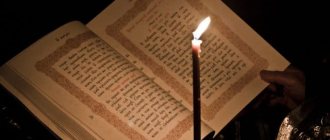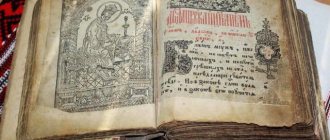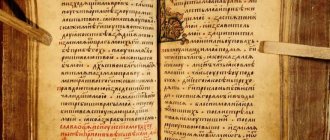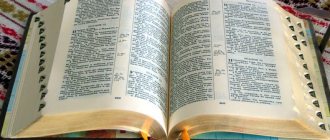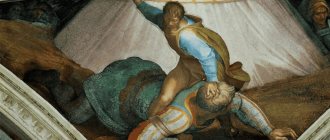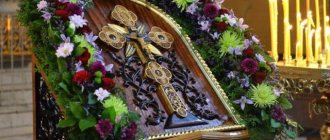Psalm 85 read:
Prayer to David
1 Incline Your ear, O Lord, and hear me, for I am poor and needy. 2 Save my soul, for I am holy: save Your servant, O my God, who trusts in You. 3 Have mercy on me, Lord, for I will cry to You all day long. 4 Make glad the soul of Your servant, for I have taken my soul to You. 5 For You, O Lord, are Good and Meek, and Most merciful to all who call on You. 6 Inspire, O Lord, my prayer, and listen to the voice of my supplication. 7 In the day of my tribulation I cried out to You, because You heard me. 8 There is no one like You in God, O Lord, and there is no one according to Your work. 9 All the nations that you have created will come and worship before you, O Lord, and glorify your name, 10 for you are great, and you work wonders, you are the only God. 11 Teach me, O Lord, in Thy way, and I will walk in Thy truth; Let my heart be glad to fear Your name. 12 I will confess to You, O Lord my God, with all my heart, and I will glorify Your name forever: 13 For Your great mercy is upon me, and You have delivered my soul from the lowest hell. 14 O God, the transgressors rose up against me, and a host of powers sought my soul, and did not offer it to You before them. 15 And You, O Lord my God, Generous and Merciful, Long-suffering, and Much-merciful and true, 16 look upon me and have mercy on me, give Your power to Your servant, and save the son of Your servant . 17 Do with me a sign for good, and let those who hate me see and be ashamed, because You, Lord, have helped me and consoled me.
Letter K. Spread of the handwritten Psalter from the collection of D. V. Piskarev. RSL. XVI century https://lib-fond.ru
Reasons to Read Psalm 86
In relation to Psalm 85, we can identify key situations in which reading or listening to an audio version of the psalm will serve as a source of inspiration, support for resolving difficult circumstances:
▪️ For health problems. Do not violate the code of honor, the code of doctors and physicians, but also rely entirely on science, the final decision is up to whom? Or maybe you already know? I think yes. So believe in it, everything will be fine in the end.
▪️ In case of danger. You shouldn’t look for the dangers of your specialty, pull God’s beard and test his kindness, but if you accidentally get into trouble, they won’t leave you.
▪️ From getting rid of enemies, when faith wavers. Fluctuations in faith are a natural process and expected at the stages of fragile faith, or during strong attacks from enemies. But the path is yours, your task is to go through it...
Psalm 85 in Russian:
David's Prayer.
1 Incline Your ear, O Lord, and hear me, for I am poor and needy.
2 Preserve my soul, for I fear Thee; Save, my God, Your servant who trusts in You.
3 Have mercy on me, O Lord, for I cry to You every day.
4 Make glad the soul of Your servant, for to You, O Lord, I lift up my soul,
5 For You, O Lord, are good and merciful and abundant in mercy to all who call on You.
6 Hear, O Lord, my prayer and give ear to the voice of my supplication.
7 In the day of my trouble I cry to You, because You will hear me.
8 Among the gods there is no one like You, O Lord, and there is no work like Yours.
9 All the nations that You have created will come and worship You, O Lord, and glorify Your name,
10 For You are great and do wonders; You, O God, are the only One.
11 Teach me, O Lord, in Thy way, and I will walk in Thy truth; establish my heart in the fear of Your name.
12 I will praise You, O Lord my God, with all my heart, and glorify Your name forever,
13 For great is Your mercy toward me: You have delivered my soul from the grave of hell.
14 God! the proud have risen up against me, and a crowd of rebels seeks my soul: they do not represent You before them.
15 But You, O Lord, are a generous and gracious God, slow to anger, abounding in mercy and truth,
16 Look upon me and have mercy on me; Grant Thy strength to Thy servant, and save the son of Thy servant;
17 Show me a sign for good, so that those who hate me may see and be ashamed, because You, O Lord, have helped me and comforted me.
Background and themes
While the superscript places this psalm in the sons of Korah, Christian commentators have been undecided on the period in which the psalm was written. One suggestion is that it was written towards the end of Saul's reign.[3] Alexander MacLaren argues that the setting of Psalm 85 matches the description in the Book of Nehemiah in which only a portion of the Jewish people returned from the Babylonian captivity. They returned "to a ruined city, to a fallen Temple, and to a land of sorrow, where they were surrounded by jealous and powerful enemies."[3]
According to Jewish commentators, the sons of Korach speak prophetically of the end of the Babylonian captivity. They pray that God will also bring the Jewish people back from Roman exile and completely remove their wrath. The imagery of the “meeting” of goodness and truth hints at the relationship between Israel's truth and God's righteousness. When Israel adheres to the truth, God will respond with righteousness; He will send rain to produce a bountiful harvest.[4] In International Standard Bible Encyclopedia
also interprets the "kiss" shared by Righteousness and Peace (in the KJV translation) as meaning the spiritual union of "God stooping down from heaven to meet earth and earth, rejoicing in Him, foretelling the glory of salvation for men."[5]
According to Midrash Tehillim, the land referred to in this psalm is the Land of Israel, of which the Holy Scripture states: “The land that the Lord your God cares for; the eyes of the Lord your God are always fixed on her” (Deuteronomy 11:12). God is waiting for the Jewish people to fulfill the mitzvot (biblical commandments) associated with the Earth, such as tithing the harvest and observing Shmita (the creative year) and Yovel (the Year of Jubilee) - and when they do, both they and the land will find favor in the eyes God.[6]
John Calvin Summarizes the message of Psalm 85 as follows. After God's people returned from Babylonian captivity, they suffered new hardships. The voice of the people in the psalm cries out to God for deliverance on three points. Firstly, as a continuation of God's grace in returning people from captivity. Secondly, due to the long period of their suffering. Finally, in hope and confidence in God's promises of blessing. In this last point, Calvin links the restoration of Israel to the future Kingdom of Christ.[7]
Kissing or fighting?
Image of "The Kiss of Justice and Peace" (KJV translation; Hebrew: צֶ֖דֶק וְשָׁל֣וֹם נָשָֽׁקוּ tseshek
) became a popular subject for works of art from the Middle Ages to the 18th century.[8]
However, the Hebrew root n-š-q
(Hebrew: נשק) has several translations, including "to kiss", "to fight" and "to fight against each other".[9] According to Eder, the word describes a dynamic type of contact, whether positive or negative.[9]
The Midrash understands this interaction in a turbulent context, relating it to God consulting with His ministering angels about whether to create the first man. Midrash says:
Rabbi Simon said: “When the Holy One, blessed be He, came to create Adam, the ministering angels united in groups and parties, some of them saying: “Let him be created,” while others called: “Let him not be.” created. ' Thus it is written: "Chesed [Kindness] and Truth fought together, Righteousness and Peace fought each other" (Psalm 85:11). Chesed said: “Let him be created, for he will spread works of love”; Truth said: “Let it not be created, for it is made up of lies”; Righteousness said, “Let him be created, for he will do righteous deeds”; The world said, “Let it not be created, for it is full of strife.”
“What did the Saint do? He took the Truth and threw it to the ground. As it is written: “And the truth was thrown to the earth...” (Daniel 8:12). The ministering angels said before the Almighty: “Lords of the worlds! Why do You put Your ruler of the court to shame? The Almighty replied: “Let Truth arise from the earth!” This is what is meant when it is written: “Truth will arise from the earth”” (Psalm 85:12).[10]
References
- Parallel Latin/English Psalter/Psalm 84 (85) Archived 2017-05-07 in the Wayback Machine Mediumist.net
- ^ a b
Nulman 1996, p. 209. - ^ a b
Guzik, David (2019).
"Psalm 85 - Prayer for Revival and Restoration." The indestructible word
. Retrieved January 19, 2022. - Abramowitz, Rabbi Jack. “Truth, meet kindness. Kindness, it's true." Orthodox Union
. Retrieved January 19, 2010. - Bromiley 1995, para 44.
- "Midrash Tehillim / Psalm 85" (PDF). matsati.com. October 2012. Retrieved January 19, 2022. (password: www.matsati.com)
- Calvin, John (1847). Commentary on the Book of Psalms
.
III
. Translated by Anderson, James. Society of Calvin Translators. pp. 366, 367. - ^ a b c
Rosenberg and Funaroli 1982, para. 252. - ^ a b
Eder, Sigrid (July 2022).
“Do Justice and Peace Really Kiss Each Other?” Vetus Testamentum
.
67
(3):387–402. - "Rolling Truth to the Ground" (PDF). elmad.pardes.org. January 2017. Retrieved January 19, 2022.
- "Teillim - Psalms - Chapter 85." Chabad.org. 2022. Retrieved January 26, 2022.
- Nulman 1996, para. 317.
- Brauner, Reuven (2013). "Shimush Pesukim: A Complete Index to the Liturgical and Ceremonial Uses of Biblical Verses and Passages" (PDF) (2nd ed.). paragraph 42.
- Sherman 1987, para. 64.
- "Psalms for Special Occasions." Psalms online
. Retrieved January 19, 2022. - Kantika 2022.
- Anthem 2022.
- Portier-Young 2014, para. 328.
- "Psalm 85" (2003)
- Gates and Mann 2012, pp. xxi–xxiii.
- Lavin 2005, para. 178.
- McCarthy 2012, para. 183.
Sources
This article incorporates text from the free content Work. . Text taken from Holy Scripture
, Jewish Publication Society of America.
To learn how to add open-licensed text to Wikipedia articles, see this instructions page.
For information on reusing text from Wikipedia, please see the terms of use. [[Category: Free content from the Jewish Publication Society of America]]
- Bromiley, Geoffrey W. (1995). International Standard Bible Encyclopedia
. Wm. B. Eerdmans Publishing. ISBN 9780802837851 .CS1 maint: ref = harv (link to website) - Gates, Jamie; Mann, Mark, ed. (2012). Cultivating the Prophetic Imagination
. Wipf and Stock Publishers. ISBN 9781621895886 .CS1 maint: ref = harv (link to website) - Lavin, Irving (2005), "Bernini in St. Peter's Basilica: Singularis in Singulis, in Omnibus Unicus
", in Tronzo, William (ed.),
St. Peter's Basilica at the Vatican
, Cambridge University Press, ISBN 9780521640961 CS1 maint: ref=harv (link) - McCarthy, Eli Sasaran (2012). Becoming a Nonviolent Peacemaker: Virtue Ethics for Catholic Social Teaching and US Policy
. Wipf and Stock Publishers. paragraph 183. ISBN 978-1-62-189854-2. - Nulman, Macy (1996). Encyclopedia of Jewish Prayer: Ashkenazi and Sephardic Rites
. Jason Aronson. ISBN 1461631246 .CS1 maint: ref = harv (link to website) - Portier-Young, Anathea E. (2014). Apocalypse versus Empire: Theologies of Resistance in Early Judaism
. Wm. B. Eerdmans Publishing. p. 328. ISBN 978-0-80-287083-4. - Rosenberg, Pierre; Funaroli, Mark (1982). France in the Golden Age: 17th-Century French Paintings in American Collections
. Metropolitan Museum of Art. ISBN 9780870992957 .CS1 maint: ref = harv (link to website) - Sherman, Rabbi Nosson (1987). The Complete Artscroll Siddur
(2nd ed.). Published by Mesorah Publications, Ltd. ISBN 978-0-89906-6509 .CS1 maint: ref = harv (link to website) - "Liturgical Information / Third Sunday of Advent (B)." canticanova.com
. 2022. Retrieved January 19, 2022. - "Hymns for the 85th Psalm." gymnary.org
. 2022. Retrieved January 19, 2022.
Four Virtues
Verse 10 of the KJV describes the virtues as a meeting: “Charity and truth meet together; righteousness and peace kissed each other", in erotic imagery:[18] which became a popular theme for works of art from the Middle Ages to the 18th century.[8] These include paintings by Tiepolo, Lanfranco, Pompeo Batoni, Nicolas Prevost, and Laurent de la Haire.[8] In 2003, American artist John Augustus Swanson produced the work Psalm 85
.[19][20] The verse was also engraved on the papal tiara which Napoleon gave to Pope Pius VII.
The four virtues, Mercy, Truth, Righteousness (or Justice) and Peace, are allegorically referred to as the Four Daughters of God.[21] The psalm is also quoted in nonviolent movements, such as the 1993 US Catholic Bishops document, which contains the verse “for he will speak peace to his people.”[22]
- Mercy and truth
, 13th century
- Der Kuß von Gerechtigkeit und Friede
, Antwerp, gr. 1580
- Kiss of peace and justice
by Laurent de la Haire, 1654
- Justice and peace
from Tiepolo, 18th century
Uses
In Judaism
In Sephardic tradition, Psalm 85 is read after Kaddish (Titkabel) during the afternoon service on Yom Kippur Eve.[2] Sephardi Jews also recite this psalm along with many others on Yom Kippur.[12]
Verses 5 and 8 (in Hebrew) are part of Selichot;[13] verse 8 is also read during the morning service at Pesukei Dezimra.[14]
Psalm 85 is read to express gratitude, as a prayer for livelihood, and as a prayer for help in times of trouble.[15]
In Catholicism
The beginning of Psalm 85 is recommended as an introduction or antiphon to Gaudete Sunday, the third Sunday of Advent.[16]
